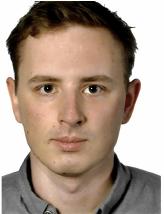Dr. David Binder

David Binder
Universität Tübingen
WSI - Programmiersprachen
Sand 13
72076 Tübingen
Germany
- Telephone
- +49 - (0) 70 71 - 29 - 70 516
- Telefax
- +49 - (0) 70 71 - 29 - 50 82
- david.binder(at)uni-tuebingen.de
- Office
- B211
- Office hours
- by appointment
Personal website
A list of my publications, slides for my presentations and my teaching activities are available on my personal website.Research Projects
Uroboro
Publications
Grokking the Sequent Calculus (Functional Pearl)
by David Binder, Marco Tzschentke, Marius Müller, and Klaus Ostermann
In Proc. Int’l Conf. Functional Programming (ICFP). ACM Press, 2024.
Learn More
Decomposition Diversity with Symmetric Data and Codata
by Klaus Ostermann, Julian Jabs, David Binder, and Ingo Skupin
In Proceedings of Symposium on Principles of Programming Languages (POPL 2020), 2020.
Learn More
